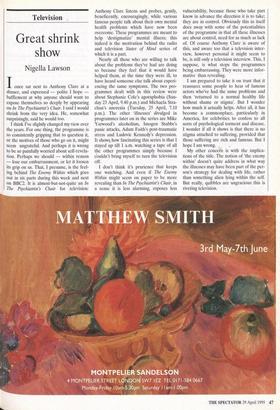Television
Great shrink show
Nigella Lawson
Ionce sat next to Anthony Clare at a dinner, and expressed — polite I hope bafflement at why anyone should want to expose themselves so deeply by appearing on In The Psychiatrist's Chair. I said I would shrink from the very idea. He, somewhat surprisingly, said he would too.
I think I've slightly changed my view over the years. For one thing, the programme is so consistently gripping that to question it, or the motives of those who go on it, might seem ungrateful. And perhaps it is wrong to be so painfully worried about self-revela- tion. Perhaps we should — within reason — lose our embarrassment, or let it loosen its grip on us. That, I presume, is the feel- ing behind The Enemy Within which goes out in six parts during this week and next on BBC2. It is almost-but-not-quite an In The Psychiatrist's Chair for television: Anthony Clare listens and probes, gently, beneficently, encouragingly, while various famous people talk about their own mental health problems which have now been overcome. These programmes are meant to help `destigmatize' mental illness; this indeed is the motivation behind the radio and television States of Mind series of which it is a part.
Nearly all those who are willing to talk about the problems they've had are doing so because they feel that it would have helped them, at the time they were ill, to have heard someone else talk about experi- encing the same symptoms. The two pro- grammes dealt with in this review were about Stephanie Cole's agoraphobia (Sun- day 23 April, 9.40 p.m.) and Michaela Stra- chan's anorexia (Tuesday, 25 April, 7.10 p.m.). The other 'illnesses' divulged in programmes later on in the series are Mike Yarwood's alcoholism, Imogen Stubbs's panic attacks, Adam Faith's post-traumatic stress and Ludovic Kennedy's depression. It shows how fascinating this series is that I stayed up till 1 a.m. watching a tape of all the other programmes simply because I Couldn't bring myself to turn the television off.
I don't think it's prurience that keeps one watching. And even if The Enemy Within might seem on paper to be more revealing than In The Psychiatrist's Chair, in a sense it is less alarming, exposes less vulnerability, because those who take part know in advance the direction it is to take; they are in control. Obviously this in itself does away with some of the potentialities of the programme in that all these illnesses are about control, need for as much as lack of. Of course Anthony Clare is aware of this, and aware too that a television inter- view, however personal it might seem to be, is still only a television interview. This, I suppose, is what stops the programmes being embarrassing. They were more infor- mative than revealing.
I am prepared to take it on trust that it reassures some people to hear of famous actors who've had the same problems and then 'returned to a normal healthy life without shame or stigma'. But I wonder how much it actually helps. After all, it has become a commonplace, particularly in America, for celebrities to confess to all sorts of psychological torment and disease. I wonder if all it shows is that there is no stigma attached to suffering, provided that those suffering are rich and famous. But I hope I am wrong. .
My other concern is with the implica- tions of the title. The notion of 'the enemy within' doesn't quite address in what way the illnesses may have been part of the per- son's strategy for dealing with life, rather than something alien lying within the self. But really, quibbles are ungracious: this is riveting television.


























































 Previous page
Previous page